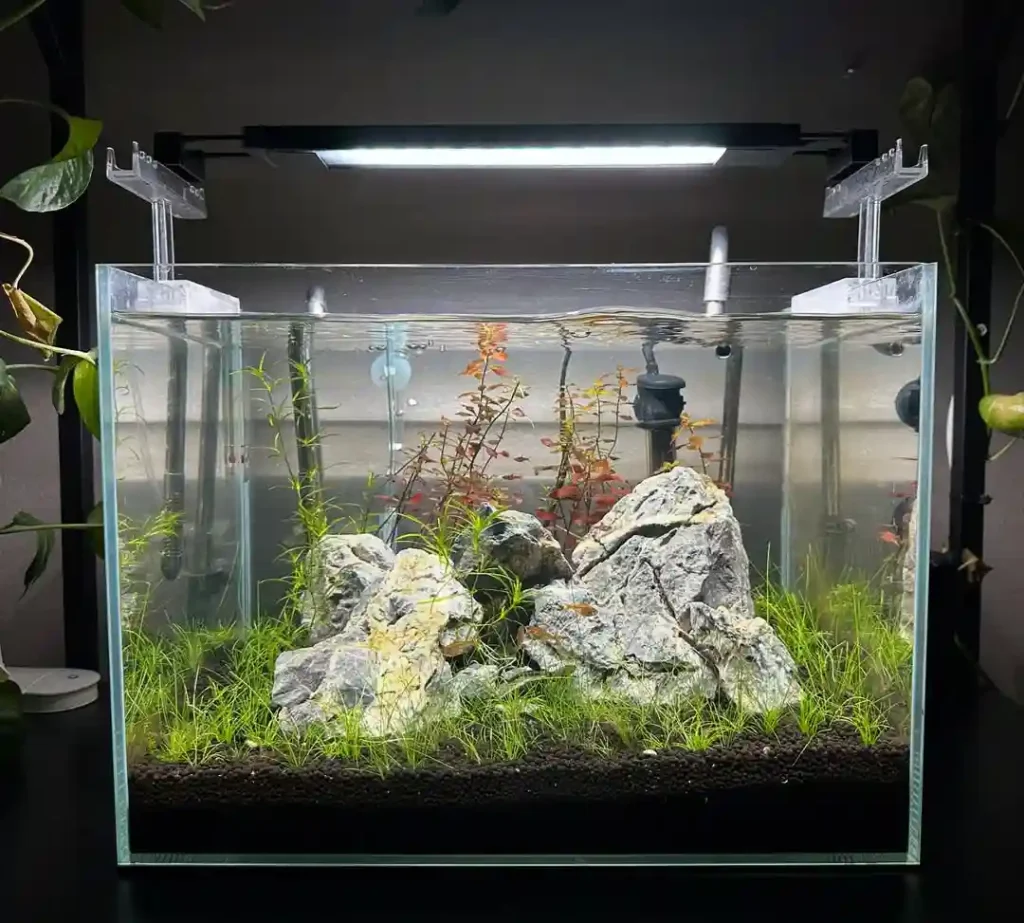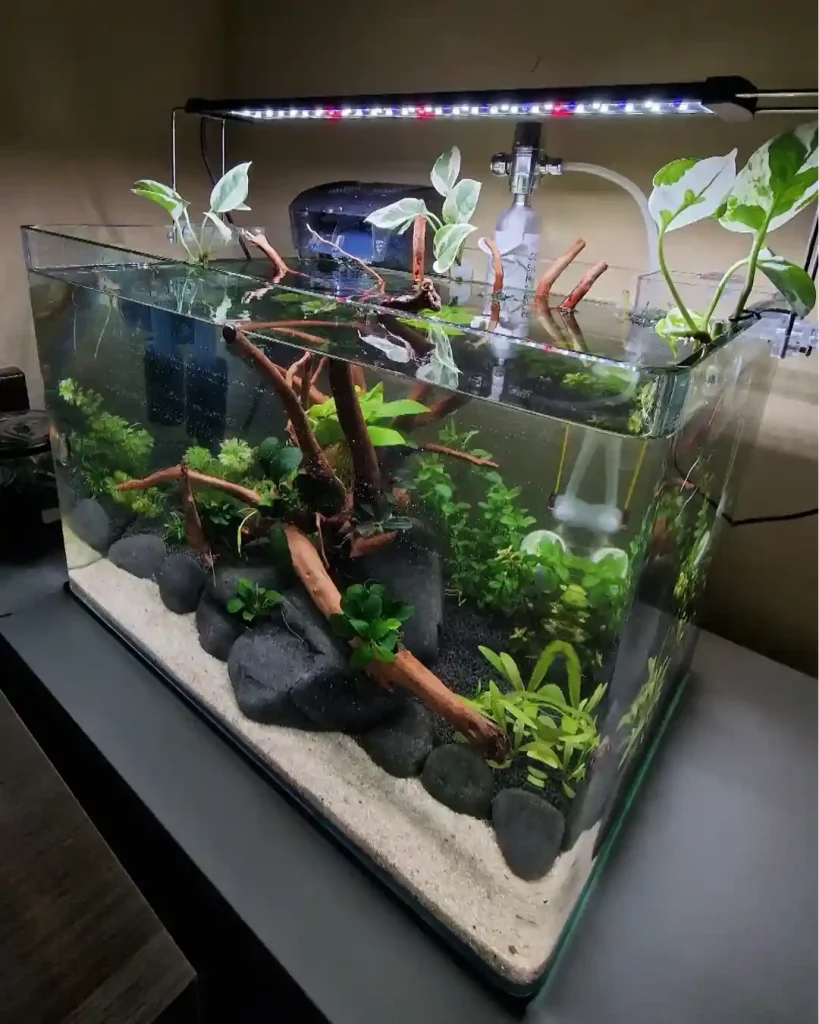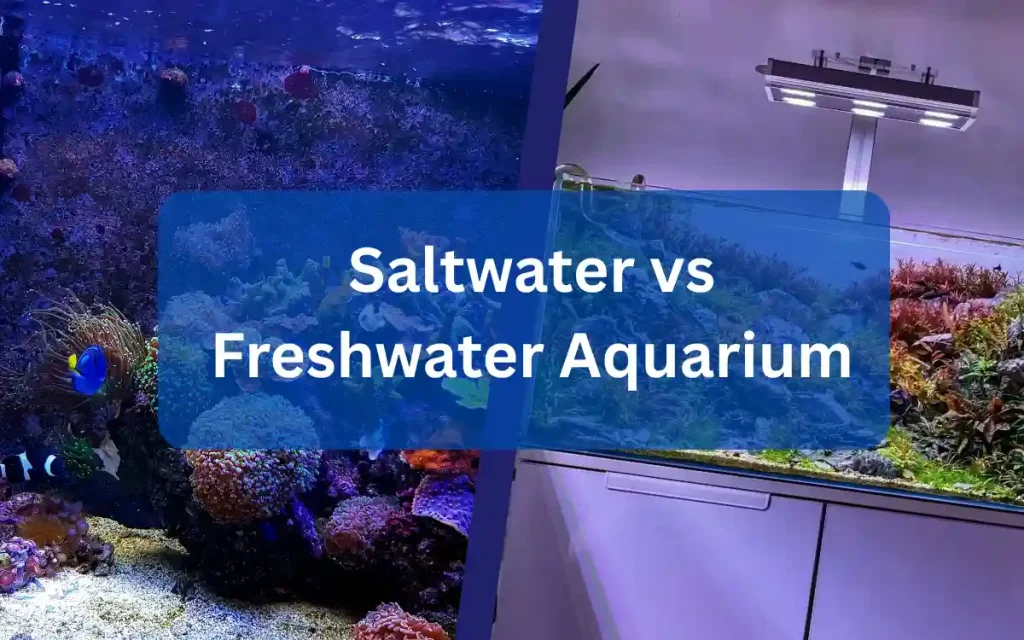A 10 gallon aquarium is one of the most popular choices for new fishkeepers. It’s small enough to fit in apartments or bedrooms but big enough to give your fish a stable environment. Beginners love it because it’s affordable, manageable, and still offers room for aquascaping and community setups.
In this guide, we’ll cover everything you need to know: how to set up a 10 gallon tank step by step, which equipment works best, stocking ideas for fish and invertebrates, maintenance routines, and common problems to avoid.

What Makes a 10 Gallon Aquarium a Good Choice?
Advantages
- Affordable: Tanks and equipment are reasonably priced.
- Compact: Fits on desks, shelves, or small stands.
- Beginner-friendly: Easier to manage than tiny 2–5 gallon tanks, which fluctuate too quickly.
Limitations
- Stocking is restricted — you can’t keep large or messy fish.
- Water quality can shift faster than in a 30–50 gallon tank.
- Care routines must be consistent to avoid stress on fish.
Who Should Choose a 10 Gallon Tank?
- Beginners who want a manageable first aquarium.
- Students or apartment dwellers with limited space.
- Hobbyists interested in nano setups, shrimp tanks, or a betta showcase.
Step-by-Step: Setting Up a 10 Gallon Fish Tank
1. Choosing the Right Tank & Location
A standard 10 gallon tank usually measures 20″ x 10″ x 12″. Place it on a sturdy, level surface that can hold over 100 lbs when filled. Avoid direct sunlight (causes algae) and drafts (causes temperature swings).
2. Adding Substrate & Decorations
- Substrate: Gravel is easiest, sand looks natural, and nutrient-rich soil works for planted tanks.
- Plants & Decor: Live plants improve water quality, but artificial ones work too. Add caves, driftwood, or rocks for hiding spots.
- Aquascaping Idea: Leave open space in the middle for swimming, with plants or rocks along the back and sides.
3. Installing Essential Equipment
- Filter: Hang-on-back (HOB) filters are efficient, sponge filters are gentle for bettas/shrimp, and internal filters are compact.
- Heater: Necessary for tropical fish (set to 76–78°F). Coldwater setups don’t require heating.
- Lighting: LED lights are best. For planted tanks, choose full-spectrum lighting. Keep lights on 8–10 hours daily.
4. Filling the Tank & Cycling
- Fill with tap water but treat with a dechlorinator (like Seachem Prime).
- Cycling explained simply: Fish waste becomes ammonia → bacteria convert it to nitrite → then to nitrate. Cycling builds this bacteria colony so fish stay safe.
- Beginner cycling tip: Use bottled bacteria or seeded media to speed things up. Expect 2–4 weeks before adding fish.
Best Fish for a 10 Gallon Tank

Stocking Guidelines
A 10 gallon tank can hold 6–8 small fish. Overcrowding leads to stress, aggression, and poor water quality. Always add fish gradually.
Beginner-Friendly Fish Options
- Betta fish – A single betta with plants and snails works beautifully.
- Guppies, mollies, platies – Hardy, colorful, and lively.
- Small schooling fish – Neon tetras, ember tetras, or harlequin rasboras (keep at least 6).
- Bottom dwellers – Pygmy corydoras or kuhli loaches for cleanup.
Alternative Stocking Ideas
- Shrimp tank: Cherry shrimp or ghost shrimp are active and low-maintenance.
- Snail tank: Nerite snails or mystery snails add variety and eat algae.
- Single-species nano tank: A group of 8 ember tetras looks striking in a planted setup.
Aquascaping & Plant Ideas for 10 Gallons
Easy Beginner Plants
- Anubias – grows slowly, attaches to wood or rock.
- Java fern – hardy and shade-tolerant.
- Hornwort – fast-growing and great for nitrate absorption.
Carpet Plants for a Natural Look
- Dwarf hairgrass
- Java moss
Hardscape Options
- Smooth river rocks
- Spider wood or driftwood
- Slate caves
Layout Examples
- Jungle style: Dense plants, driftwood, and natural cover.
- Minimalist: Open space with a single centerpiece rock or wood.
- Balanced community: Plants in the back, rocks in the middle, open swimming space in front.
Maintaining a 10 Gallon Aquarium
Routine Care
- Water changes: 25–30% once a week.
- Glass cleaning: Use a magnetic cleaner or sponge.
- Gravel vacuuming: Removes waste from the substrate.
Monitoring Water Quality
Check parameters weekly with a liquid test kit:
- Ammonia: 0 ppm
- Nitrite: 0 ppm
- Nitrate: below 20 ppm
- pH: 6.5–7.5
Feeding Tips
- Feed once or twice daily.
- Only what fish eat in 1–2 minutes.
- Skip feeding one day per week to avoid buildup.
Common Problems & Fixes in 10 Gallon Tanks
- Cloudy water: Often bacterial bloom; clears after cycling.
- Algae growth: Reduce lighting, avoid overfeeding, add snails.
- Fish dying: Likely poor water quality; check ammonia/nitrite.
- Overcrowding: Leads to stress — rehome or upgrade tank.
Budget & Starter Kit Options
Are Starter Kits Worth Buying?
Yes, for most beginners. Just check if the filter and heater are sized correctly.
Recommended Equipment Bundles
- Aqueon 10 Gallon Kit – includes tank, filter, heater, and LED light.
- Fluval Spec V (5 gallons but high quality) – ideal for betta or shrimp setups.
Cost Breakdown (Typical 10 Gallon Setup)
| Item | Average Cost |
| Tank & stand | $50–$100 |
| Filter | $20–$40 |
| Heater | $15–$30 |
| Substrate | $20–$30 |
| Decorations & plants | $25–$50 |
| Test kit | $25 |
| Fish & food | $20–$60 |
| Total: Around $150–$300. |
FAQs
Can I keep angelfish or goldfish in a 10 gallon tank?
No. Both species grow too large and need more space.
Do I need a heater for a 10 gallon aquarium?
Yes, if you keep tropical fish. Coldwater tanks (like for some minnows) don’t need one.
What’s the best filter for a 10 gallon tank?
A small hang-on-back filter or sponge filter works well.
How many plants can I keep in a 10 gallon tank?
As many as you’d like, but leave space for swimming. A mix of background and midground plants works best.
Is a 10 gallon tank good for beginners?
Yes — it’s a perfect size for your first community or nano setup.
Final Thoughts
A 10 gallon aquarium is one of the best starting points for new fishkeepers. It’s affordable, versatile, and manageable, but still large enough to give fish a healthy home. With the right equipment, careful stocking, and regular maintenance, your tank will thrive.
Start small, learn the basics, and once you’re comfortable, you can always upgrade to a larger setup. Fishkeeping is a journey, and your 10 gallon aquarium is the first exciting step.
➡ Looking for more inspiration? Check out our Aquarium Guides for detailed care tips and fish profiles.


